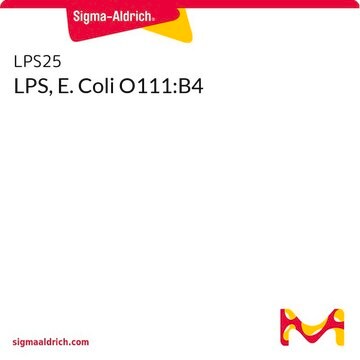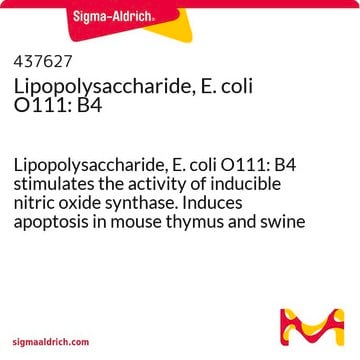推薦產品
一般說明
Formalin-fixed and heat-killed Staphylococcus aureus cells bearing protein A that bind to the Fc portion of human IgG subclasses 1, 2, and 4, and to IgG from other species (binding capacity: ≥2 mg human IgG/100 mg cells). Used for many purposes, including radioimmunoassays, enzyme immunoassays, agglutination, and immunoprecipitation of antigens. PANSORBIN also stimulates B-lymphocyte production and inhibits neoplasm growth. Lyophilized from preparations of Cat. No. 507858. Note: size of 5 g or 1 g refers to the wet cell weight.
Lyophilized from preparations of Cat. No. 507858. Note: size of 5 g or 1 g refers to the wet cell weight.
包裝
Packaged under inert gas
警告
Toxicity: Standard Handling (A)
外觀
Lyophilized from PBS, 0.1% NaN₃.
重構
Following reconstitution, aliquot and refrigerate (4°C). Stock solutions are stable for up to 1 month at 4°C.
Reconstitute in sterile distilled H₂O.
Reconstitution with 10 ml sterile dH₂O yields a 10% (w/v) cell suspension.
其他說明
Kierszenbaum, F., et al. 1991. Immunology74, 317.
Meikle, P.J., et al. 1991. J. Biol. Chem.266, 22569.
Ezaki, O., et al. 1989. Biochem. Biophys. Res. Commun.159, 1368.
Murakami, H., et al. 1988. Biochem. J.256, 917.
Kessler, S.W. 1975. J. Immunol.115, 1617.
Meikle, P.J., et al. 1991. J. Biol. Chem.266, 22569.
Ezaki, O., et al. 1989. Biochem. Biophys. Res. Commun.159, 1368.
Murakami, H., et al. 1988. Biochem. J.256, 917.
Kessler, S.W. 1975. J. Immunol.115, 1617.
法律資訊
CALBIOCHEM is a registered trademark of Merck KGaA, Darmstadt, Germany
PANSORBIN is a registered trademark of Merck KGaA, Darmstadt, Germany
訊號詞
Danger
危險聲明
危險分類
Acute Tox. 3 Oral - Aquatic Chronic 3
儲存類別代碼
6.1C - Combustible acute toxic Cat.3 / toxic compounds or compounds which causing chronic effects
水污染物質分類(WGK)
WGK 3
分析證明 (COA)
輸入產品批次/批號來搜索 分析證明 (COA)。在產品’s標籤上找到批次和批號,寫有 ‘Lot’或‘Batch’.。
Eriko Kudo et al.
International journal of molecular medicine, 41(4), 2366-2374 (2018-01-18)
Copper metabolism Murr1 domain containing 1 (COMMD1) has multiple functions in the regulation of protein stability at the plasma membrane and in the cytoplasm. However, the regulation of COMMD1 transcriptional has remained to be elucidated. In the present study, the 5'‑flanking
Deborah L Burkhart et al.
PLoS genetics, 6(6), e1001003-e1001003 (2010-06-30)
The retinoblastoma tumor suppressor (Rb) is a potent and ubiquitously expressed cell cycle regulator, but patients with a germline Rb mutation develop a very specific tumor spectrum. This surprising observation raises the possibility that mechanisms that compensate for loss of
Ambica Bhandari et al.
Methods in molecular biology (Clifton, N.J.), 763, 51-71 (2011-08-30)
The mammalian epidermis is a self-renewing stratified squamous epithelium. Its basal cell layer contains proliferating keratinocytes that exit the cell cycle when they move into the suprabasal compartment. These cells activate a gene differentiation program aimed at building a protective
Jenny Hsu et al.
Nature communications, 10(1), 2939-2939 (2019-07-05)
E2F transcription factors are central regulators of cell division and cell fate decisions. E2F4 often represents the predominant E2F activity in cells. E2F4 is a transcriptional repressor implicated in cell cycle arrest and whose repressive activity depends on its interaction
Natalia Varlakhanova et al.
Molecular and cellular endocrinology, 332(1-2), 180-188 (2010-10-23)
The SMRT (Silencing Mediator of Retinoid and Thyroid hormone receptors) corepressor mediates gene repression by nuclear receptors and other transcriptional factors. The SMRT protein serves as a key nucleating core that organizes the assembly of a larger corepressor complex. We
我們的科學家團隊在所有研究領域都有豐富的經驗,包括生命科學、材料科學、化學合成、色譜、分析等.
聯絡技術服務






